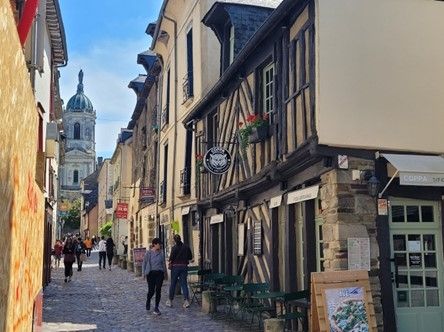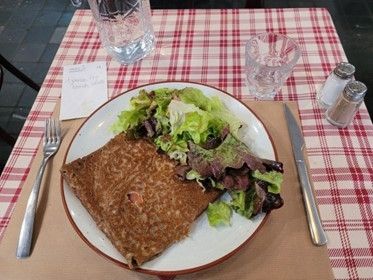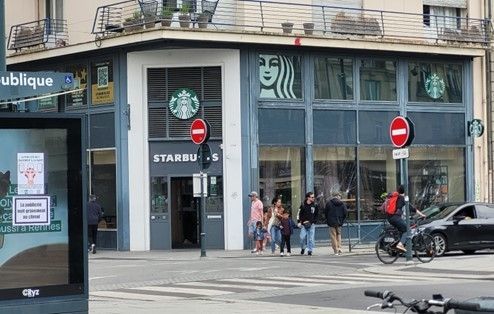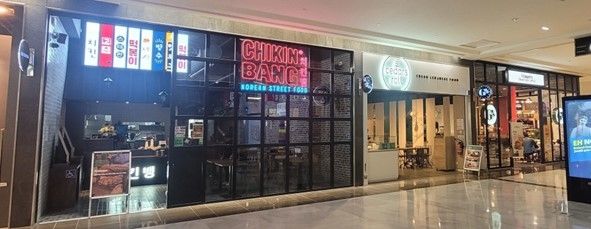Some Cultural Differences Between France and America
One of the best delights of traveling is learning about different ways to live. While participating in CIEE's Intensive French Language program at Rennes, I got the great opportunity to experience many different cultural differences between France and the United States, some of which I had only read about before and others which were completely new. This is a small list of cultural differences I
noticed during the trip and how I reacted to them.
General Culture:
- People don't smile or make eye contact with strangers in public very much as in the US.
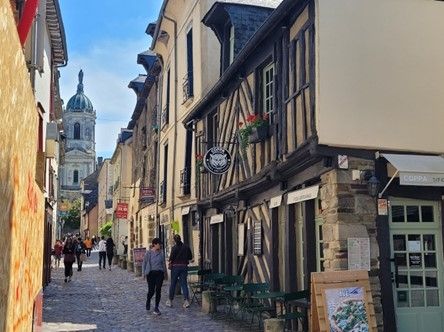
- People in the street are usually very well dressed compared to Americans, and often wear hats or scarves.
The French prize reading and literacy to a much greater extent than Americans. You see this everywhere:
◦ Small bookstores (librairies) are so common that there's one on most street blocks. They are often packed with people browsing the shelves.
◦ There's an open-air book market (marché de livres) for used books (livres d'occasion) on the Rennes plaza every day when it's not raining.
◦ Debates and interviews with authors are staples of French evening TV and radio
- All French people take English and most also take a third language which can be German, Spanish, or Italian. Nevertheless, the French are still known for not necessarily being good at foreign languages though, and they are famously behind Germany and most Nordic countries in terms of English proficiency. However, they are still better than Americans at foreign language education.
- Smoking is much more common in France. This is especially surprising given that the United States has less strict plain packaging laws than most European countries.
On the other hand, the French watch less TV than Americans. It's rare for French people to watch TV for more than thirty minutes a day, if even that. Most of the time the TV stays off. Instead, my host family likes to play music in the living room while preparing the room.
Politics:
• Demonstrations are extremely common in France and Rennes is no different. I three different demonstrations during my first four weeks in Rennes without deliberately looking for them. These are always left-wing, as Rennes leans even more to the left than most French cities. Some glass in public places has been broken by rioters, especially in establishments run by big foreign
companies like Starbucks.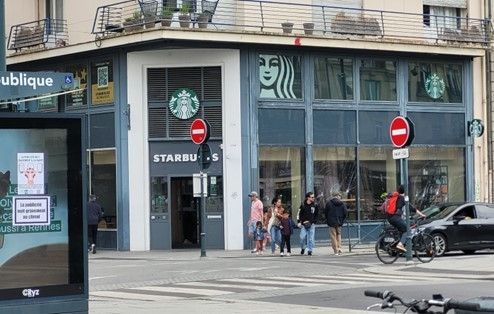
Education:- Individual universities tend to focus only on a group of fields in France, whereas American universities usually teach everything. For example, the Université de Rennes 2, a university I explored a lot in Rennes, only teaches humanities, not science.
- Also, American style campuses with giant fields and live-in dorms aren't typical in France. The typical French campus has urban-style buildings, and students live off-campus.
- Rhetoric and composition is emphasized to a level not usually seen in the American education system, especially in the national college entrance exam, le baccalaureat.
Cuisine:
- Food is taken extremely seriously and is always delicious. It's not only that the French (and Bretons) have their own special delicacies that only they make, but also that everything they make is made with a level of love and care that is much rarer in the commercialized United States. My host mom is an amazing cook and made fantastic dinners for us every night that I
was always impressed by. The French also take great care to source their ingredients well; my family bragged a lot of times about how they bought meat directly from their farmer friend. One time, when I bought apples at a supermarket, my family looked at me funny and said that apples "aren't in season right now" and that they might not be any good. In America I've never thought about whether a fruit is in season or not before buying it. It just goes to show the amazing attention to detail the French use when preparing cuisine.
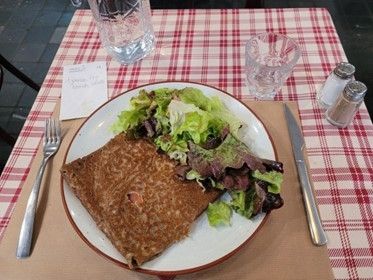
- The French have large shopping malls and supermarkets, but they prefer to source a lot of ingredients from specialty stores (charcuteries, boulangeries... ) more often than Americans.
- Meals are generally multi-course. For a fancy meal, you will often have the apéritif (appetizer) before the plat or main course, which includes bread and cheese and often salad as well. After this you will have a dessert course, and after that, coffee is often served to fight off post-meal lethargy.
- The French and American meal schedules are very different. In America we like to emphasize having a big, hearty breakfast and we even call breakfast the most important meal of the day. The biggest meal of the day is usually dinner. For the French, the petit dejeuner (breakfast) truly is petit, and people will often have only a coffee and a croissant in the morning, if anything.
Lunch is by far the most important meal of the day and usually takes more than an hour, with businesses being closed between 12:00 PM and 2:00PM. Dinner is less large and is taken very late, usually close to 8:00 PM. After four weeks of being here, my stomach still hasn't completely gotten used to this schedule! I need to eat bigger lunches.
Economy:
- The state plays a much bigger role in the economy than in Americas, and from my perspective the biggest result was a lot more free stuff. For example, most museums are free or extremely cheap, and most of the programming of the national French TV channels is available online for free, which I loved for practicing French oral comprehension.
- Taxes are much higher
- Sales tax is included in the price of the item and change is always rounded
- Most French people air-dry laundry instead of using a drying machine because it's more environmentally friendly.
◦ My host family had a drying machine, but many French families don't.
Another interesting factor of my trip was learning how American culture and globalization have affected France. It's fair to say that contemporary French life, especially for the youth, is immersed in American culture in a way that is not usually realized by Americans when they think of the French. For a few examples:
- Social media résaux sociaux
◦ The French have completely embraced western social media, which is pretty much synonymous with American social media. While most of the content they watch is in French, a lot of the architectural and meta-language is anglophone and a lot of the trends originate from America. - Consumer Culture
◦ Centres Commericals come from American consumer culture and have English signage surprisingly oftenMany, many English loanwords, as well as weird pseudo-anglicisms.
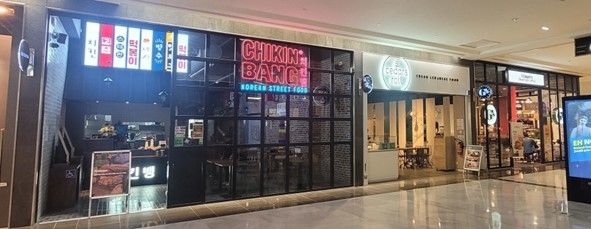
There are so many that the académie française has an entire division dedicated to proposing alternatives. I absolutely recommend traveling to France for an American and for especially someone who is not used to long-term travel, since the cultures are generally different enough to be interesting while at the same time prize many of the same fundamental values like liberty, equality, and peace, leading to relatively little culture shock.
Sean Carter
University of Colorado-Boulder
CIEE-Rennes Intensive French Language (Summer 2024)
Related Posts
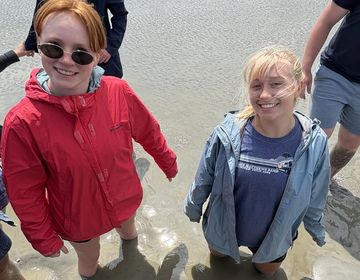
The experience as a whole
If you told me 3 months ago how much my outlook on life has changed after this experience, I wouldn’t have believed you. My decision to spend my summer in... keep reading

French Cuisine and Food Culture
What do you picture when you think of French cuisine? Croissants, crêpes, wine, and maybe escargot? During my stay in Rennes, I’ve gotten the chance to experience French cuisine and... keep reading

The challenges and benefits of having your natural family in Rennes.
If you are anything like me, change is scary. Thus, it should come at no surprise that when I arrived at the airport for my flight to Rennes, I was... keep reading
